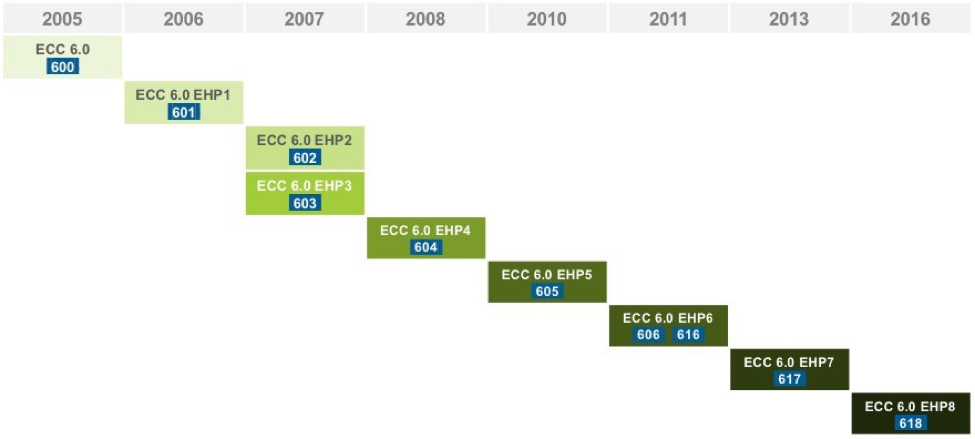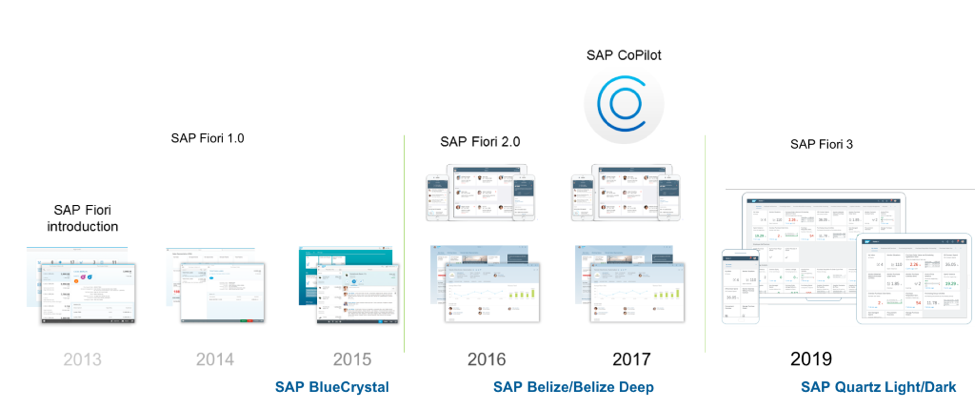SAP continues to update their offerings to further improve the user experience. While this is great to ensure our ERP systems have the greatest capabilities possible, it can be hard to keep track that our own systems are up to date. That’s why we put together a list of the SAP versions and how your business can learn more about which version you are operating.
S/4HANA Versions
SAP S/4HANA is short for SAP Business Suite 4 HANA. As the fourth version of the SAP Business Suite, it is the latest offering from SAP.
Users can decide between the on-premise and cloud versions of this offering. Both offerings are very similar in terms of lines of business, coverage and functionality.
Versions are named after the year and month that they are released (YYMM). For example, S/4HANA 1909 would correlate to the release data of September 2019.
To look up the version of your system, check the S4CORE component version in the system stack info.

S/4HANA On-Premise Versions
S/4HANA On-Premise also has several updates for each version per year. These updates will either be Feature Pack Stacks (FPS) for new features or Support Pack Stacks (SPS) for bug fixes.
The versions are outlined as follows:

SAP HANA Database Versions
S/4HANA operates on the HANA (High performance ANalytic Appliance) database.
The HANA database will end their maintenance of the 1.0 version by May 2021.
For reference the two versions referred to are HANA DB 1.00.122 (HANA 1.0 SP12 Rev 122) & HANA DB 2.00.050.0 (HANA 2.0 SPS05 Rev 50).
The last SPS of SAP HANA 2 will have a 5-year long term maintenance term which will be supported through June 2025.

ECC Versions
SAP ECC (SAP ERP Central Component) This is the predecessor for SAP S/4HANA. As a result, ECC 6.0 EHP 618 is the final release since SAP expects customers will transfer their systems to S/4HANA. The “1” in the version number states that it is enabled for the HANA database.
To identify the version, check SAP_APPL component version in the system stack information.
The updates can be viewed in this diagram:

NetWeaver Versions
SAP NetWeaver (NW) is the underlying technology layer or software stack that ECC is built on. SAP NW can be used for custom development and integration with other applications and systems and is most commonly build using the ABAP programming language. As of 2019, the most up to date version of NetWeaver is AS ABAP 7.54.
To identify the version that your business is operating, check the SAP_BASIS component version in the system stack info.
The version releases are as follows:

Fiori Versions
SAP Fiori is the new SAP interface, which appears as a set of apps addressing the most frequently used SAP functions. Previously known SAP GUI transactions are now composed into Fiori apps that users can personalize using Launchpad to further improve the user experience.

SAP Fiori Introduction was released in 2013, followed by SAP Fiori 1.0.
SAP BlueCrystal theme came out the following year in 2015.
In 2016 we saw the release of SAP Belize/Belize Deep themes in Fiori 2.0 which was followed by the updated version we use today.
This version is known as SAP Quartz Light/Dark and it is referred to as Fiori 3 (not Fiori 3.0). It is a totally new theme with a fresh, modern look and feel; and revised homepage design.
UI5 Versions
On the development side, SAP user interface for HTML 5 (SAPUI5) is the collection of libraries that are used to build desktop and mobile applications. UI5 versions must be considered for Cloud only & On-Premise deployments.
To identify the UI5 version, type sap.ui.version in browser developer tools. From there navigate to the console tab for more information.

For more up-to-date information, please refer to the link below:
https://sapui5.hana.ondemand.com/versionoverview.html
Let’s talk more about UI5 version on SAP Cloud Platform and On-Premise Deployments.
A. UI5 on Cloud only
SAPUI5 is switching from a quarterly to a monthly cloud delivery via SAP Cloud Platform. This means every four weeks a new version is provided for productive usage and version numbers will increase by one instead of by two. Additionally, every 12th version will become a long-term maintenance version.
It is important to note that only versions with long-term support receive patches for the duration of the maintenance.
Bug fixes will also be released in the next version.

B. UI5 for On-Premise deployments
A new version of SAP_UI in its initial shipment stack will typically contain a new version of SAPUI5. The SAPUI5 version, shipped as part of SAP_UI SP02, comes with long-term maintenance. During this time, SAPUI5 will maintain the biannual on-premise delivery as part of the software component User Interface Technology.
For all other SAPUI5 versions the maintenance phase ends with the release of a newer SAPUI5 version.
During these maintenance phases, SAPUI5 versions will receive bug fixes (without innovations) through SAPUI5 patches or SAP_UI SPs.

For help optimizing your SAP system or migrating to S/4HANA we encourage you to contact us today!
You have used my blog without my permission, this is not good.
ResponderExcluir